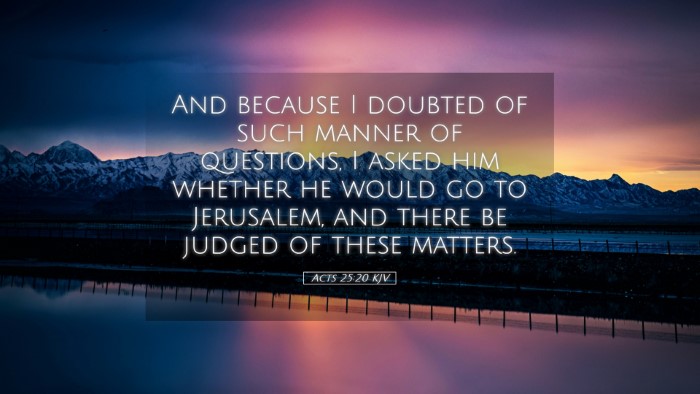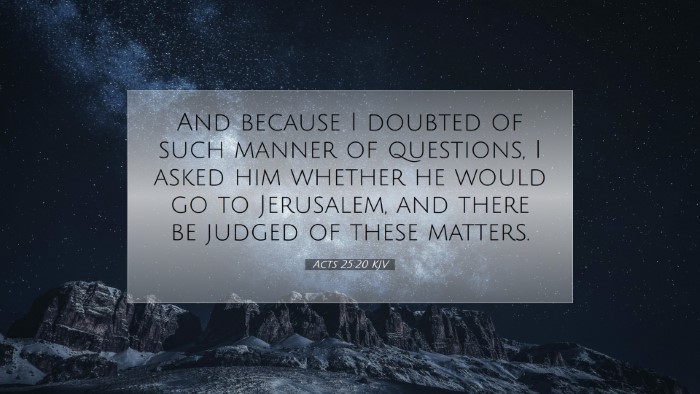Old Testament
Genesis Exodus Leviticus Numbers Deuteronomy Joshua Judges Ruth 1 Samuel 2 Samuel 1 Kings 2 Kings 1 Chronicles 2 Chronicles Ezra Nehemiah Esther Job Psalms Proverbs Ecclesiastes Song of Solomon Isaiah Jeremiah Lamentations Ezekiel Daniel Hosea Joel Amos Obadiah Jonah Micah Nahum Habakkuk Zephaniah Haggai Zechariah MalachiActs 25:20
Acts 25:20 KJV
And because I doubted of such manner of questions, I asked him whether he would go to Jerusalem, and there be judged of these matters.
Acts 25:20 Bible Commentary
Commentary on Acts 25:20
Acts 25:20 states: "And because I was at a loss how to inquire concerning these matters, I asked whether he was willing to go to Jerusalem and be tried there concerning these things."
Context and Background
This verse occurs within the narrative of the Apostle Paul's legal troubles as he stands trial before Festus, the Roman governor. Following the arrest of Paul, he faces accusations by the Jewish leaders, particularly concerning the nature of his teachings and the resurrection of Jesus. This moment is crucial as it reveals the complexity of Paul's situation, the political dynamics at play, and the intricacies involved in Roman governance.
Insights from Matthew Henry
Matthew Henry emphasizes Paul’s poise amidst uncertainty. He notes that Festus recognizes Paul’s innocence yet feels the pressure of the Jewish leaders. Henry suggests that Festus's offer to transfer Paul to Jerusalem points to the political maneuvering of the time, highlighting the precarious balance of justice and the influence of public opinion. Festus, unsure how to manage the escalating situation, reflects the challenges of governance and the difficulty of reconciling justice with pre-existing biases.
Insights from Albert Barnes
Albert Barnes provides a detailed exploration of the phrase "at a loss." He interprets this not only as a lack of understanding of the case but also as a metaphorical representation of the broader moral and ethical dilemmas faced by leaders. Barnes points out the irony in the juxtaposition of Roman law, which is expected to provide justice, against the backdrop of personal ambitions and the motives of the Jewish authorities. He notes how this highlights the challenges that civic authorities face when balancing their duties against public unrest.
Insights from Adam Clarke
Adam Clarke elaborates on the cultural and judicial implications of Festus's question to Paul. Clarke suggests that the idea of sending Paul back to Jerusalem signifies a desire to appease the Jewish leadership, demonstrating the frailty of justice when faced with political pressures. He further emphasizes the absurdity of a Roman trial concerning Jewish law and suggests that Festus's inquiry was rooted in a misunderstanding of the nature of the case and the implications for both parties involved.
Theological Implications
This verse invites deep theological reflection on the interplay of justice, power, and truth. The confusion experienced by Festus can be seen as a metaphor for the struggles of humanity in understanding divine justice among the chaos of human authority. The tension faced by Paul highlights his identity as a divine apostle caught in a flawed judicial system, pointing to the greater narrative of Christ's own trial and the injustice He suffered.
Lessons for Pastors and Theologians
- The Importance of Context: Understanding the historical context of scripture is crucial for interpretation and application.
- The Nature of True Justice: Assessing how human governance often fails to reflect divine justice encourages a search for higher truths.
- Handling Controversy with Integrity: Paul’s steadfastness serves as a model for addressing conflicts with truth and grace.
- Leadership and Responsibility: Festus's dilemma illustrates the weight of leadership and the challenges of making decisions that align with both personal convictions and public perceptions.
Conclusion
Acts 25:20 is pivotal in understanding the broader theme of the early church's challenges amidst external pressures. By studying this verse, readers can grasp the complexities involved in legal and ethical disputes, offering rich material for discussion and teaching within both pastoral and scholarly settings. The combined insights from Henry, Barnes, and Clarke provide a multidimensional perspective that enhances our understanding of this scripture's significance, urging us towards deeper theological reflection and practical application.


